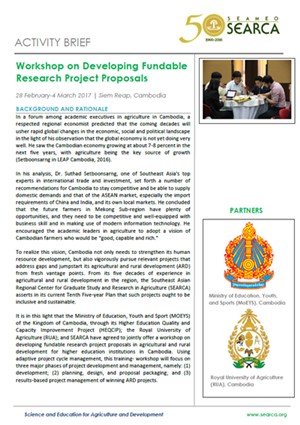BACKGROUND AND RATIONALE
 In a forum among academic executives in agriculture in Cambodia, a respected regional economist predicted that the coming decades will usher rapid global changes in the economic, social and political landscape in the light of his observation that the global economy is not yet doing very well. He saw the Cambodian economy growing at about 7-8 percent in the next five years, with agriculture being the key source of growth (Setboonsarng in LEAP Cambodia, 2016).
In a forum among academic executives in agriculture in Cambodia, a respected regional economist predicted that the coming decades will usher rapid global changes in the economic, social and political landscape in the light of his observation that the global economy is not yet doing very well. He saw the Cambodian economy growing at about 7-8 percent in the next five years, with agriculture being the key source of growth (Setboonsarng in LEAP Cambodia, 2016).
In his analysis, Dr. Suthad Setboonsarng, one of Southeast Asia's top experts in international trade and investment, set forth a number of recommendations for Cambodia to stay competitive and be able to supply domestic demands and that of the ASEAN market, especially the import requirements of China and India, and its own local markets. He concluded that the future farmers in Mekong Sub-region have plenty of opportunities, and they need to be competitive and well-equipped with business skill and in making use of modern information technology. He encouraged the academic leaders in agriculture to adopt a vision of Cambodian farmers who would be "good, capable and rich."
To realize this vision, Cambodia not only needs to strengthen its human resource development, but also vigorously pursue relevant projects that address gaps and jumpstart its agricultural and rural development (ARD) from fresh vantage points. From its five decades of experience in agricultural and rural development in the region, the Southeast Asian Regional Center for Graduate Study and Research in Agriculture (SEARCA) asserts in its current Tenth Five-year Plan that such projects ought to be inclusive and sustainable.
It is in this light that the Ministry of Education, Youth and Sport (MOEYS) of the Kingdom of Cambodia, through its Higher Education Quality and Capacity Improvement Project (HEQCIP); the Royal University of Agriculture (RUA); and SEARCA have agreed to jointly offer a workshop on developing fundable research project proposals in agricultural and rural development for higher education institutions in Cambodia. Using adaptive project cycle management, this training- workshop will focus on three major phases of project development and management, namely: (1) development; (2) planning, design, and proposal packaging; and (3) results-based project management of winning ARD projects.
OBJECTIVES
At the end of this training-workshop, participants will be able to:
- Distill the pressing needs for focused direction-setting in research and development in agricultural and rural development (ARD) in Cambodia that is inclusive and sustainable;
- Discuss the project design cycle and project proposal packaging continuum vis-à-vis identified directions for winning ARD projects in Cambodia;
- Undertake steps of analyses and prepare a logical framework matrix (based on theory of change) applying results-based project management principles;
- Outline a winning project proposal on ARD anchored on inclusiveness and sustainability principles;
- Initiate a plan for preparing or updating a syllabus on developing, designing and implementing results-based projects in Cambodia; and,
- Outline a relevant research, development, and extension (RDE) agenda on inclusive and sustainable agricultural and rural development (ISARD) in Cambodia.
PARTICIPANTS
40-45 Officials and technical staff of higher education institutions in agriculture, forestry, and environment studies in Cambodia, including government agencies whose mandate is to promote agricultural and rural development
EXPECTED OUTPUTS
The expected outputs are:
- Graduates of the training-workshop with enhanced knowledge, skills and attitudes on ARD imperatives for Cambodia and the Mekong Sub-region, tempered with inclusiveness and sustainability principles;
- Rough drafts of project proposal/s;
- Initial action plan toward preparing a course syllabus on developing, designing and implementing results-based projects; and
- RDE options for ISARD in Cambodia.
LEARNING APPROACH AND PLAN
This five-day training-workshop will use a variety of adult learning methods. It will be interactive, inclusive, and applied. Lecture-discussions and Q&A will be utilized to explain concepts, approaches, strategies and processes. It will also make use of workshops and buzz sessions to enhance the skills of the participants in the use of different tools in the management of ISARD projects. Workshop outputs will be presented in plenary sessions. Plenary sessions like the Q&A will promote exchange of knowledge and experiences among the participants. A pre-test and post-test exercise will be undertaken to gauge improvement in individual knowledge on ISARD. A re-entry action plan (REAP) will be required to get the commitment of participants in the application of learning from this training-workshop.
